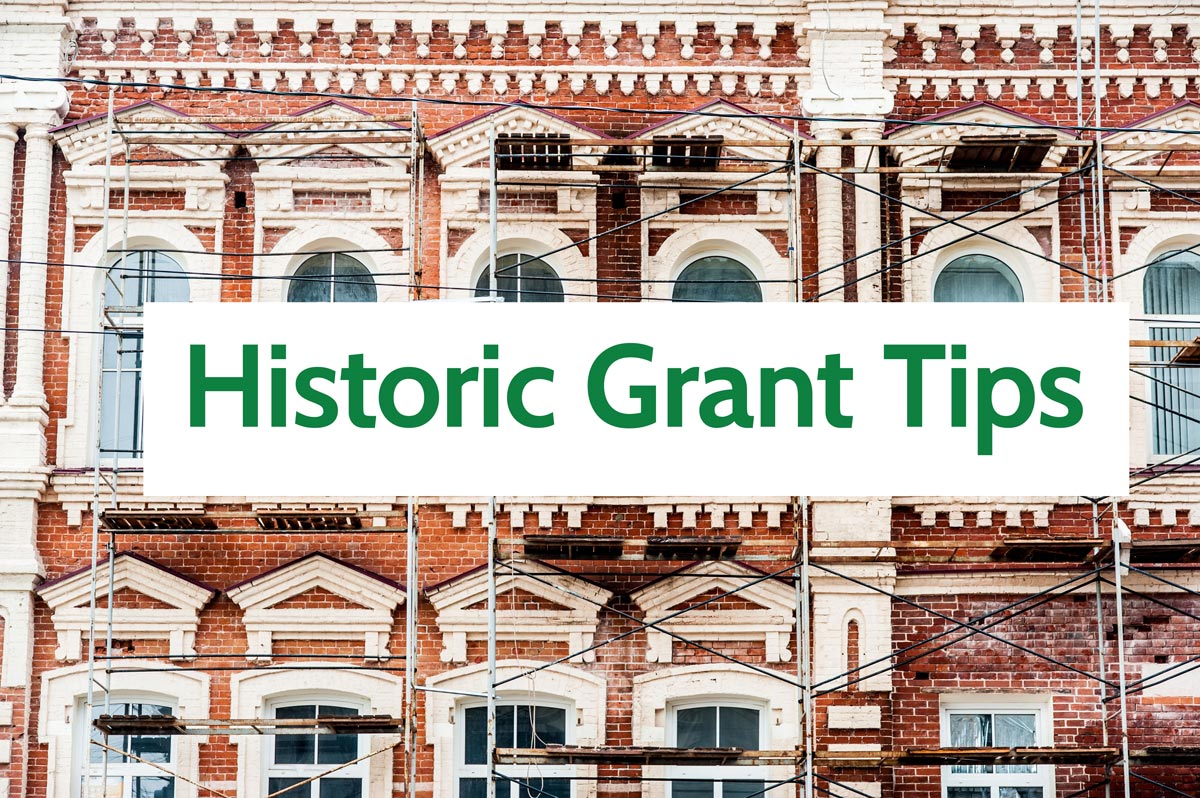Seven Tips for Writing Historic Grant Applications for the Maryland Heritage Areas Program

Joe Wojciechowski, AIA, Encore Sustainable Architects (2023 MHAA grant reviewer)
This past year, Encore Architect Joe Wojciechowski had the privilege of being selected as a reviewer for Maryland Heritage Areas Authority (MHAA) grant applications. 100 of the approximately 200 applications were awarded $5 million of matching grants to nonprofits, local jurisdictions, and state and federal agencies. The process was very competitive with only half of the applicants being funded. The next cycle of grants will be announced in mid-December for projects starting in July 2024, and based on Joe’s experience as a reviewer, he has some tips to help improve your chances of being awarded a grant. You can also check out MHAA’s Guidelines and Resources online here https://mht.maryland.gov/Pages/MHAA/heritage-areas-resources.aspx.
#1 Explain your answers to maximize available points.
So many great applications get submitted, but don’t score highly because the applicant didn’t put effort or thought into the required questions. For example, if asked how your project addresses accessibility, don’t just say “Yes”, provide some details.
#2 Develop a Plan for Your Historic Project
There are grant applications that are well-written, with an interesting project to fund, but it’s obvious there was no plan to achieve the project goals. Come into the game with a well-rounded project scope and execution plan. A good plan doesn’t just establish what the project goal is, but also elaborates on the who, where, when, why, and how.
Also, is your project timely? Is your need urgent or is the project already in motion and needs support to continue? Show that you understand the project requirements with well-defined milestones and an established timeframe.
#3 Apply for the Right Historic Grant
Make sure you are applying for the right grant. The Maryland Heritage Areas Program grants are focused on heritage tourism projects. If you are tourism focused and the grant is focused on tourism, go for it, but if you are not, find a different grant that is closer in line with your mission. The Maryland Historical Trust also offers Historic Preservation Capital and Non-Capital grants along with African American Heritage Preservation grants. And here is a list of other potential funding sources for historic preservation projects: https://mht.maryland.gov/Documents/grants/Grants_Funding_Sources.pdf.
#4 Ensure Project and Grant Priorities Align
There are 13 different local Certified Heritage Areas in the state of Maryland, each with their own distinctive character and tourism offerings. Do your background research so you understand the priorities of your area, then align your application with the local heritage area’s goals. Links to each of the heritage area websites can be found here: https://mht.maryland.gov/Pages/MHAA/heritage-areas.aspx.
#5 Find a Partner to Commit to Your Historic Project
Build a supportive team before pursuing a grant so you understand the complexity of what you are trying to do as well as the cost associated with the project.
For capital projects, team members might include a contractor, architect, engineers, etc.
Partnership teams should be defined as well. Are you part of a community objective with input from the community, or an organization, or are you an owner going solo, working with a private, community, or government entity?
#6 Have a Solid Budget Estimate
A grant budget is essentially a snapshot of projected expenditures and revenue for your proposed project. Although single line-item budgets are acceptable, they are less likely to be approved, if your estimates are too broad and in general they can make reviewers question if you haven’t done enough research. It’s also important to provide quotes and estimates from consultants and contractors if they are available.
#7 Learn and Reapply
If you apply and aren’t awarded, you can reach out to MHAA staff to request feedback on why your application was not successful. This can absolutely help you better prepare the next time you apply.
The FY 2025 Maryland Heritage Areas Program grant applications are open now for projects that will begin in July 2024, so act quickly before the deadline arrives.
You can contact Martha Waldron at martha.waldron@maryland.gov, or Andrew Arvizu at andrew.arvizu@maryland.gov with any questions about where, when and how to apply.
Before & After Winning Your Historic Grant
Encore Sustainable Architects are experts in historic architecture in Maryland, preparing for, funding, and execution. Reach out to us for insight and guidance every step of the way. Tell us about your project!
